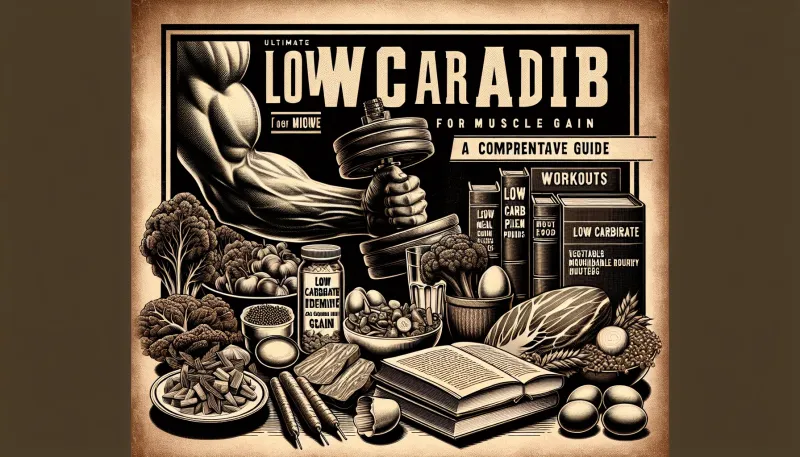Ultimate Low-Carb Diet for Muscle Gain: A Comprehensive Guide

Discover the ultimate low-carb diet for muscle gain. This comprehensive guide covers everything you need to know about effective muscle building on a low-carb diet.
Introduction
In recent years, the low-carb diet for muscle gain has gained significant popularity among fitness enthusiasts and bodybuilders. The traditional approach to muscle gaining has often emphasized high-carb intake, but emerging research and practical experiences have shown that a low-carb diet can also be highly effective. This comprehensive guide aims to provide you with a detailed understanding of how a low-carb diet can help in muscle gain, the science behind it, and practical tips to implement it successfully.
The Science Behind Low-Carb Diets and Muscle Gain
Metabolic Adaptation
The human body is remarkably adaptable and can switch its primary energy source from carbohydrates to fats through a mechanism known as metabolic adaptation. When you reduce carbohydrate intake, your body increases fat oxidation, making it more reliant on fat for fuel. This shift can be advantageous for muscle gain because it helps in better nutrient partitioning, where more nutrients are directed towards muscle rather than fat storage.
Insulin Sensitivity
Low-carb diets have been shown to improve insulin sensitivity, which is critical for muscle protein synthesis. Improved insulin sensitivity means that your muscles can effectively utilize the protein you consume, promoting muscle repair and growth.
Hormonal Balance
Hormones like testosterone and growth hormone play a crucial role in muscle building. Low-carb diets help maintain these hormones at optimal levels, further supporting muscle gain. Additionally, the reduction in carbohydrate intake often results in lower levels of systemic inflammation, creating a favorable environment for muscle growth.
Structuring Your Low-Carb Diet for Muscle Gain
Macronutrient Breakdown
While varying approaches exist, a common macronutrient ratio for a low-carb muscle gain diet might be:
- Protein: 30-35% of total calories
- Fat: 50-60% of total calories
- Carbohydrates: 5-10% of total calories
These ratios can be adjusted based on individual needs, but the key is to maintain a low carbohydrate intake while ensuring enough protein and healthy fats to support muscle growth and overall health.
Protein Sources
High-quality protein is essential for muscle repair and growth. Excellent sources of protein for a low-carb diet include:
- Lean meats (chicken, turkey, and beef)
- Fish (salmon, tuna, and mackerel)
- Eggs and dairy (Greek yogurt, cheese)
- Plant-based proteins (tofu, tempeh, and legumes, although in moderation due to their carb content)
Healthy Fats
In a low-carb diet, fats become your primary energy source. Incorporate these healthy fats into your diet:
- Avocado
- Nuts and seeds
- Olive oil and coconut oil
- Fatty fish (salmon, sardines)
Carbohydrate Sources
Although the focus is on low-carb, it's essential to include a small amount of carbohydrates from nutrient-dense sources such as:
- Green leafy vegetables (spinach, kale)
- Cruciferous vegetables (broccoli, cauliflower)
- Berries (strawberries, raspberries) in moderation
Supplementation
While whole foods should make up the bulk of your nutrition, certain supplements can enhance your efforts:
- Protein Powder: Whey or casein protein can help meet your protein needs.
- Branched-Chain Amino Acids (BCAAs): Useful for muscle recovery and reducing muscle soreness.
- Creatine: Enhances strength and muscle gain by increasing ATP production in your muscles.
- Fish Oil: Provides omega-3 fatty acids, which have anti-inflammatory properties.
Training While on a Low-Carb Diet
Resistance Training
To maximize muscle gain on a low-carb diet, prioritize resistance training. Focus on compound movements such as squats, deadlifts, bench presses, and rows, which work multiple muscle groups simultaneously and stimulate muscle growth effectively.
Recovery
Adequate recovery is critical when on a low-carb diet. Ensure you get enough rest, stay hydrated, and incorporate active recovery days to prevent overtraining. Additionally, consider incorporating cyclical low-carb days to replenish muscle glycogen stores.
Common Mistakes to Avoid
- Not Eating Enough Protein: Ensure you are hitting your protein targets to support muscle repair and growth.
- Overlooking Hydration: Low-carb diets can have a diuretic effect, leading to dehydration. Drink plenty of water.
- Ignoring Micronutrients: Focus on consuming a variety of nutrient-dense foods to prevent deficiencies.
- Inadequate Calorie Intake: Ensure you consume enough calories to support your muscle-building goals.
Conclusion
Adopting a low-carb diet for muscle gain is not only feasible but can also offer numerous benefits, from improved insulin sensitivity to optimized hormonal balance. By carefully structuring your diet, paying attention to macronutrient ratios, and incorporating a solid training regimen, you can achieve your muscle-building goals effectively while reaping the health benefits of a low-carb lifestyle. Always consult with a healthcare provider before making significant dietary changes to ensure they are appropriate for your individual health needs.



























